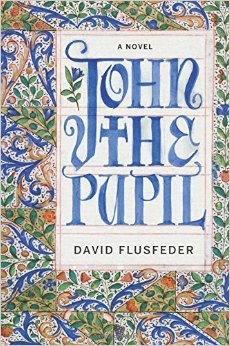 From JOHN THE PUPIL by David Flusfeder, From pgs. 79-82
From JOHN THE PUPIL by David Flusfeder, From pgs. 79-82
Because they were calling us demons, because they could make as if we were a threat to them and to their village and to their low crops, that gave them the excuse to look through our bags and there was nothing we could do to stop them. They found the treasures I had gathered and they threw them around, as if they were worthless, although some thought them proof of our sorcery, and they affected still to believe that we were inspired by the Devil to stop their crops and bring a blight upon them, but they were, as Brother Bernard shouted out to them before they stopped his mouth with foul rags, simple thieves.
I do not know if I understand anything, if the unworthy capacities that impressed my Master are merely a trick of mimicry and memory. Numbers are shapes that I can repeat and multiply; but maybe they signify nothing outside of themselves. Without correspondence in my heart or spirit, their true essence goes untouched. My Master uses his intellect as an instrument to apprehend holy truths and deliver them to those that can use them best; mine is a performance to impress an audience, to plead, not quite to pray. Except, when I was in the witness of my harshest audience yet, harsher than my Master, harsher even than the Principal, I failed.
And covered by darkness, the solitary tolling of a bell, and a new sound rose to our ears, a slow heavy clinking, engine of hell. But this is wrongly told, I am leaping ahead of my story, how may I switch from day to night, it was still daylight, our interrogation proceeded, we were powerless except for the infinite mercy of God.
Cupidity and avarice overcame their superstition and supposition, and they decided after all that we were criminals carrying a great treasure. When we were hungry they did not feed us, when we were thirsty they did not give us water, instead they spat at us some of the beer they were drinking, and then sat together away from us as if they were frightened they had gone too far and maybe we were demons after all, the Pope’s Friars, who might enact a terrible revenge.
Then came the sound of him, and he arrived in the torchlight, our old enemy, the malevolent Simeon the Palmer. After that, even at this remove, I have difficulty in remembering the events in the order that they occurred. Simeon was wary of us, but he knew what he desired. And I understand now that it was in that first moment of our meeting, when he saw my hand go to the scrip in which I carry my Master’s Great Work, that he had decided what he would steal from us.
That was not all they took. They took the apparatus to demonstrate to the Pope, and they threw aside the rest of our things, the bundle of rags that my Master had given me for when we had lost all hope, and the treasures that I had gathered and which they did not have the eyes to see, and the writings I have made, because they have no interest in them. And they drove us out of their village and we sat on a hillside by a stream and Brother Bernard, like a beast, knelt on all fours and drank from the stream to try to wash away the foul taste of the rags, and this was the time of the greatest sorrow.
Which we made worse, by chiding one another. We had failed and I was unable to consider any course of action, because I was thinking about our return and my Master’s face when I would tell him of our failure, all his great hopes gone.
My companions told me that I should open the package that my Master gave me. This was even though they had lost all respect for my powers and my leadership and, by extension, my Master’s authority and wisdom were becoming null. But in time of no hope, fleeting comfort may be found in even the slightest possibility of a change of state. The sky was dark, a sliver of moon above us, the North Star, and I ripped the cloth with Brother Bernard’s knife.
I do not know what I was expecting. My fingertips recognised it instantly, but my understanding tarried behind. I had to hold it, open it, feel the fall of the pages, some few of which have been inscribed by me. I told them,
It is my Master’s Book.
Both my companions asked what then was in the box that the Palmer had stolen. I think some of my authority was already returning, but I did not give an answer because it was at that moment that the night was torn apart. A crack of thunder as loud as the trumpets at Jericho sounded, followed by screams of fear, the noises of consternation and confusion, villagers running below as if the Devil himself were riding them.
I returned to the empty village with my reluctant companions and saw there the wreckage of the shining box that the Palmer had stolen and the smell of sulphur from the firecracker that my providential Master had placed beneath its lid.
We gathered what was left of our possessions and returned to the road, walking by starlight, and when my companions asked why they were chosen for this journey, I answered that I had chosen them, because they were the two members of our Order that I loved the best.
From JOHN THE PUPIL by David Flusfeder Copyright © 2015 by David Flusfeder. Reprinted courtesy of Harper, an imprint of HarperCollins Publishers.
